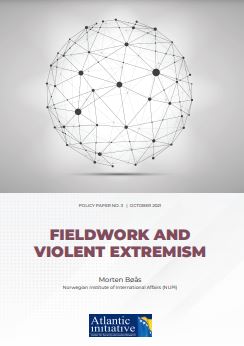Fieldwork and Violent Extremism
Fieldwork and Violent Extremism
Author(s): Morten Bøås
Subject(s): Islam studies, Criminology, Studies in violence and power, Radical sociology , Peace and Conflict Studies
Published by: Atlantska inicijativa: Udruženje za promicanje euroatlantskih integracija BiH
Keywords: fieldwork; violence; extremism; ideology;
Summary/Abstract: Violent extremism is a difficult subject to research, and it is equally challenging to conduct fieldwork in areas affected by violent extremist ideologies. The reasons for this are numerous; this policy paper will address some of the most serious, based on the author’s personal experience with research and fieldwork in violent and dangerous environments. Unfortunately there is no one-size-fits-all recipe for safe, ethical and successful fieldwork; nor can we prepare for all the eventualities that might occur when conducting fieldwork in areas affected by violent extremist ideas or among actors who have taken such ideas on-board. While all types of research - fieldwork-based or not - confront us with questions of ethics or risk in one way or another, working in violent contexts where extremist ideas are present throw them into much sharper relief. Research in violent and dangerous places is complicated and the accompanying fieldwork often involves confusion, failures and mistakes - while demanding creativity, flexibility and reflexivity on the part of researchers. There are several tough questions we should ask ourselves before, during and after fieldwork in violent and politically volatile places. In this paper I will speak as honestly as possible about how I have grappled with the practical and ethical challenges of conducting fieldwork in insecure places in the past, and how this has had an impact on my work in Sahel countries such as Mali, where extremist religious ideas in the form of Salafi-Jihadism is a source of inspiration for several insurgencies. I will address issues concerning the personal safety of researchers and respondents in the field – including informant anonymity, the positionality of the researcher, and how we can design and generate fieldwork research methods that provide safety for researchers as well as respondents, without compromising data quality and ethical standards. This paper is, therefore, not yet another discussion about the technical specificities of certain research methods or whether the objectives of research are best reached through a qualitative or quantitative approach. Rather my focus is on the messy realities of fieldwork in violent places. It is simply not possible to present a single template for safe, ethical and successful fieldwork - but we can learn from experiences and particularly from the mistakes we make. As such this is an attempt to reflect on some of the mistakes that I have made during fieldwork, and to define some of the dilemmas that arise doing this type of research on violent extremist ideologies and the actors supporting them – dilemmas that we can prepare to face, but that irrespective of what some ethics research boards seems to believe, we cannot simply resolve once and for all. This means that while I will spend some time on the dos and don’ts, I will mostly focus on the ‘question marks’ since this is where the most difficult challenges lie, while noting that it is not so easy to be aware of where the dilemmas are located.
Series: Atlantska inicijativa - Policy Paper
- Page Count: 16
- Publication Year: 2021
- Language: English
- Content File-PDF
- Introduction

